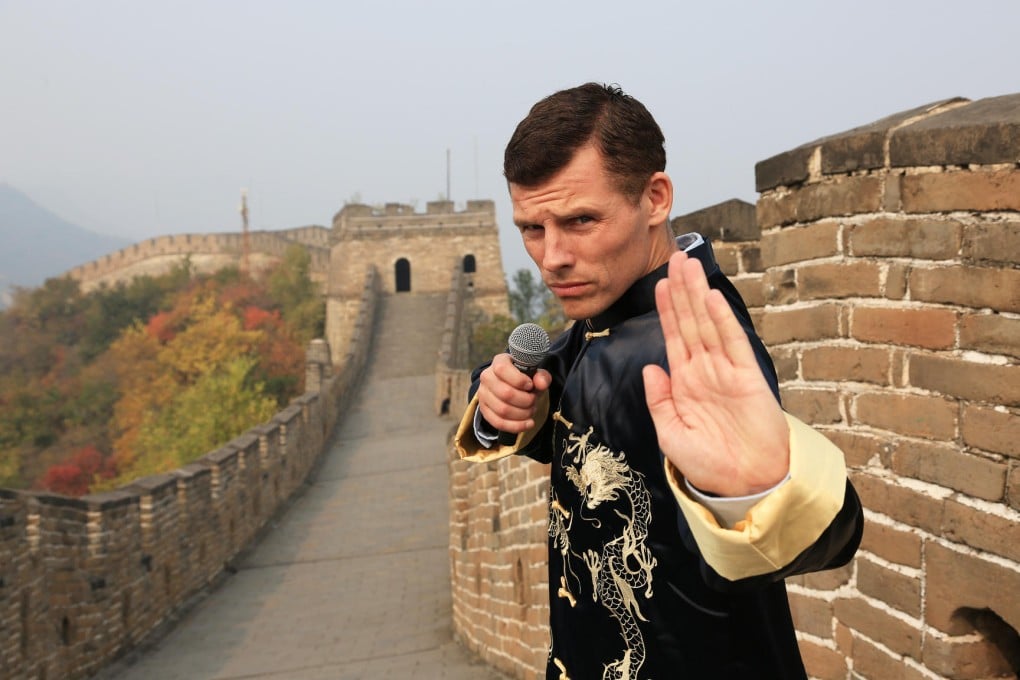How I scaled the Great Wall of comedy and made Chinese laugh
Irish-American, Putonghua-speaking comedian Des Bishop (a.k.a. Bi Hansheng) tells Dinah Gardner what material works best with Chinese audiences

I was born in London, because my parents were living there at the time. When I was less than a month old, they moved back to New York. They had just been waiting for me to arrive. So I grew up in Flushing, Queens, which coincidentally is now completely Chinese, but wasn't when I was growing up. At 14, after getting kicked out of school - for academic reasons, no big deal - I ended up at a boarding school in Ireland. The government pays for your university in Ireland, so I couldn't really go back to New York and spend US$20,000 a year on college when I could get it for free. I didn't want to, either, so I studied English and history at University College Cork.
I stopped drinking at 19. Most people start then, but I stopped. My first year of college was a washout because of booze. So I went back to New York, got three months sober and then returned to college. I had to repeat my first year. It was through a sober guy - a guy I knew from not drinking - that I got into comedy. I was getting tickets to this comedy club where he was the resident MC and he kind of pushed me into trying stand-up. And once I tried it I couldn't stop. It's very different to acting. There's a massive nerve rush and all that stuff. That was 1997. I quickly decided I would do it for a living. I moved to Dublin in 1998 and became a full-time comedian. I guess there's something in the genes; my father's a performer. In my extended family, funnily enough on both sides, there are a lot of big personalities. My mother says it was kind of always there, teachers used to say it, the priest in our local parish used to say it: they always used to say I would be a politician or a performer - something public.
I used to say ... all the time, "I'd love to learn Chinese, but who has the time, you know?"
I was studying kung fu (after university, in the early 2000s). Our master was from Hong Kong. He used to take us for Chinese food every Sunday after training - dim sum and all that. Then Crouching Tiger, Hidden Dragon came out and there was a whole revival of kung fu films. All of this came together like a perfect storm right when I met Leo (a Chinese friend who had moved to Ireland). I used to say to Leo all the time, "I'd love to learn Chinese, but who has the time, you know?" But after I learned Gaelic for a TV show ( In the Name of the Fada), I thought it would be great (to make a comedy show about studying Chinese). For five years, from 2008 to 2013, I was trying to get the money together, then finally Irish TV station RTE came through, and I went to China for a year to film Breaking China (the show that saw Bishop attend language school and live with a Chinese family in Beijing).
WATCH Bishop in action
In China, I don't really care about English-language stand-up; I only want to do it in Chinese. I've also done an hour (of stand-up) in New Zealand in Chinese, for Chinese people living there. I don't even know what makes the Chinese laugh … I just tell funny stories about my life in China. I'm more of a storyteller than a joke teller. The great thing about China is there's (historically) been no stand-up, so the most common form of stand-up comedy is basic observation - the "that's so true" style of comedy. The Chinese love it if you do a joke about (Chinese) characters because they think it's great that you know anything about them … When I had started going out with a Chinese girl, I did a lot of stuff about that. They love that - like the pitfalls of being in a cross-cultural relationship. Obviously, you can't joke about the government, but you try to push the boundaries a little. I use a lot of comedy tricks, I do a news rap, a rap about the Chinese news, that goes down well. Fame in China is when you really need to worry about things. Right now stand-up comedy is so low profile it's not really an issue.